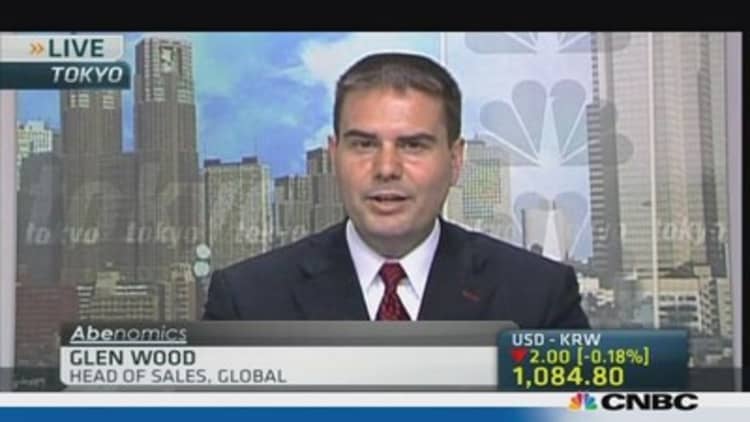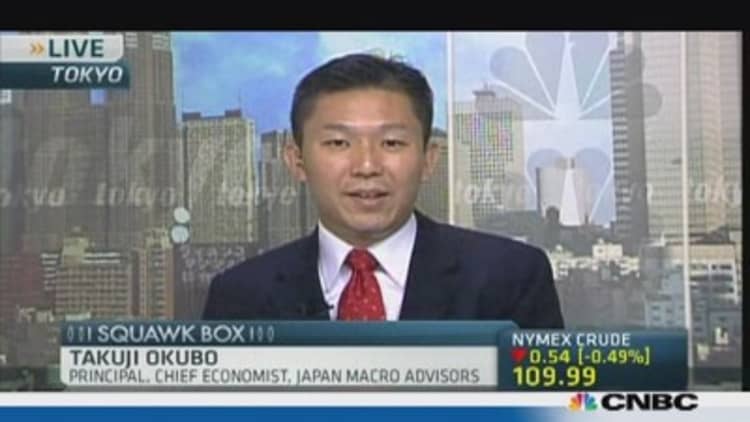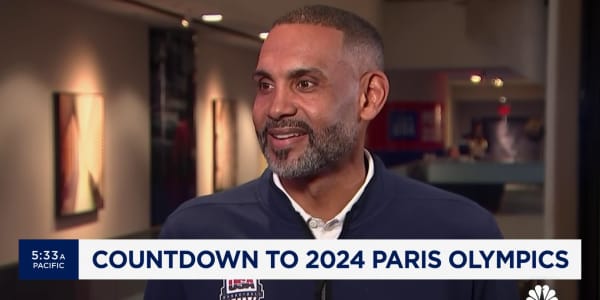After Tokyo residents celebrated their city's selection to host the 2020 Summer Games and Japan trumpeted the good economic tidings the Olympics would bring, the scolds wasted no time.
A Wall Street Journal piece cited experts asserting that the Olympic predictions were "too sunny" and that "this enthusiasm is clearly misplaced." Fortune.com proclaimed the Tokyo Olympics would not produce an "economic miracle" (as if that were the bar) but would be at best a "pleasant distraction" from the country's woeful predicaments (debt twice the size of the economy, "war drums" beating in China—and don't forget the nuclear meltdown).
But these harsh assessments are challenged even by experts who don't share the Tokyo government's vested interest in a rose-colored forecast.
(Read more: Tokyo to host 2020 Summer Olympics)
"The benefits will outweigh the costs," said Maria Toyoda, a political science professor at Villanova University.

While some point to out-of-control spending as a source of Japan's economic troubles, she said, those arguments are often off-point.
Japan is rightly known for wasteful public works expenditures, Toyoda acknowledged, but "it is a common misconception that Japan's debt is a result of that spending." The real culprit is the collapse of Japan's massive asset bubble in 1991, she said. And rather than being the problem, government spending is central to Prime Minister Shinzo Abe's Keynesian economic strategy, which seems to be working at the moment.
Mark Conrad, director of the sports business program at Fordham University, said the Olympics spending could come to be viewed as a pillar of the Abenomics stimulus.
"It could help jump-start the economy," he said.
Despite some positive economic signs, many Japan watchers remain nervous about outsize spending and the massive debt. But the stock and bond markets indicate no concern that Japan's debt level is unsustainable, Toyoda said.
In any case, the $4.5 billion earmarked for Olympics was set aside four years ago, when Japan lost the 2016 bid to Rio de Janeiro.
"As the Tokyo governor said, it's money in the bank," Toyoda said.
(Read more: Japan upgrades economic assessment for September)
Also lost on some pessimists are the less tangible benefits of hosting the world.
Pace University business professor Robert Vambery pointed out that Japan has had two decades of a depressed economy, has been surpassed by China and is watching its population age rapidly.
"Japan really needs this Olympics," he said.

The uplift began with the bid win and will continue as Tokyo gets in shape for the big event and then finally sees people from all over the globe arrive at its doorstep, Vambery said.
He puts the cultural and entertainment value of the 2020 games at "not less than $15 billion and as much as $30 billion," not including revenue from travel, hotels, shopping, etc.
For what it's worth—and its worth is debatable—the Tokyo government predicts a $30 billion economic boost from its Olympics. Investors turned bullish on the news of the winning bid, pushing the Nikkei index up 4 percent this week.
Standard & Poor's lent its own lukewarm blessing in a report, saying: "A well-run 2020 Games would not adversely affect our rating on the Tokyo Metropolitan Government."
Lure of the rings
It is true that past Olympics have not not delivered the hoped-for returns for some host cities.
It took Montreal three decades to pay down the $2 billion loss it incurred for the 1976 games. The British Olympic Association says London broke even on the 2012 games, though some are skeptical. And in Athens, which had 800 percent budget overruns, the $15 billion sunk into the 2004 Olympics seems rather profligate in light of events since.
(Slideshow: Olympic Cities: Booms and Busts)
The China Daily figures Beijing came out $140 million ahead after spending $43 billion. But even if the 2008 Olympics did not pay for itself, Vambery said, consider the value of the thrills and national pride of 1.3 billion people.
The 1964 Olympiad was likewise a coming-of-age moment for Japan, a country that had rapidly risen from the defeat and destruction of World War II. It also came at a sweet spot of development for Tokyo, which really needed the infrastructure built for the games.
This time, said Toyoda of Villanova, fewer venues will need to be built, and the costliest item is a new national stadium. But even that will not be so disruptive, as it will go on the site of the stadium built for the '64 games.
Japan's last round with the Olympic rings was the 1998 Winter Games, and one might look to Nagano to see how that city fared with its investment.
Unfortunately, that is not possible. A Japanese official ordered the records burned.
—By CNBC's Matt Twomey. Follow him on Twitter @Matt_Twomey.




